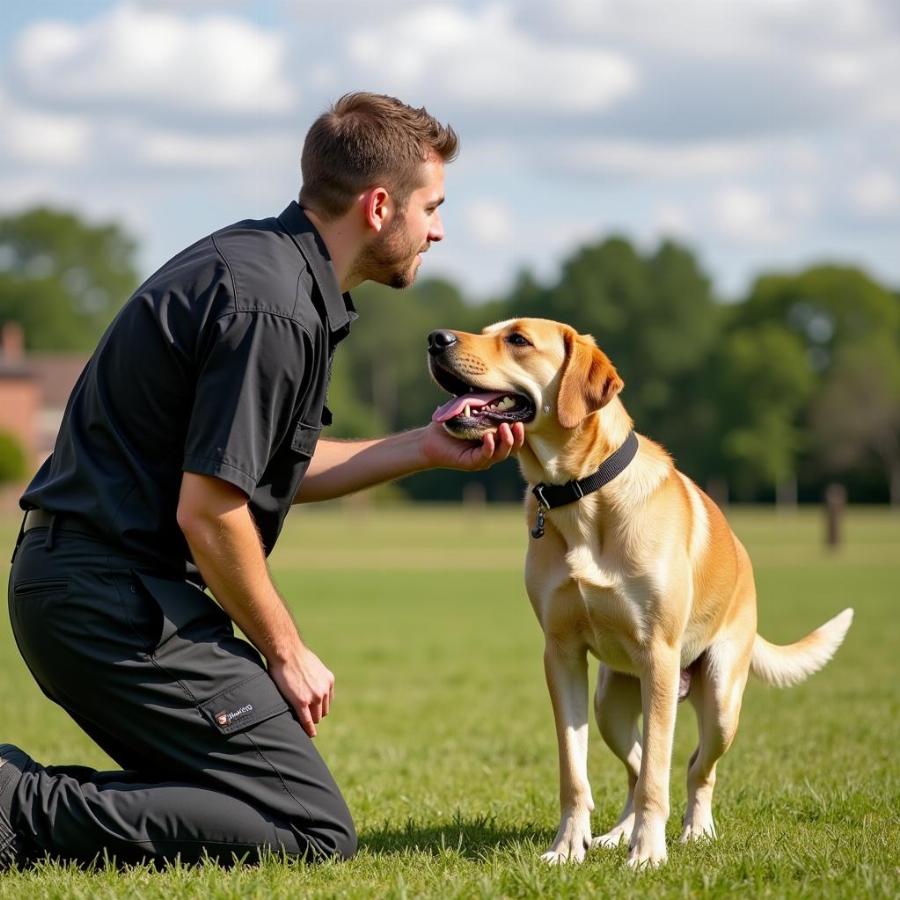Watch Dogs 3 PS3, though not directly related to real-life canines, sparks interest in surveillance and protection. This naturally leads us to think about real-world security and the role of guard dogs. While you can’t hack a real dog’s systems like in the game, choosing the right guard dog breed for your home requires careful consideration. This article will guide you through selecting the ideal canine protector for your family and property.
Choosing the Right Guard Dog Breed: Key Factors
Protecting your home and family is a serious matter, and selecting the right guard dog breed requires careful thought. It’s not just about size and bark; temperament, trainability, and your lifestyle all play vital roles. What works for a sprawling farm might not be suitable for a suburban home.
Temperament and Trainability: A Balanced Approach
The best guard dogs aren’t necessarily the most aggressive. Look for breeds known for intelligence, loyalty, and a protective instinct, but also for their ability to be trained. A well-trained dog is a safe dog, both for your family and visitors.
Size and Physical Characteristics: Does Size Matter?
While size can be intimidating, it’s not the only factor. A smaller, agile breed can be surprisingly effective, especially if it’s quick and alert. Consider the environment you live in. A large dog might not be suitable for a small apartment.
Lifestyle Compatibility: Matching Your Dog to Your Life
Do you have children? Are you active or prefer a more laid-back lifestyle? Your lifestyle should significantly influence your breed choice. An energetic breed needs plenty of exercise and stimulation, while a more laid-back breed might be better suited to a quieter home.
Top Guard Dog Breeds: A Closer Look
Certain breeds have proven themselves time and again as excellent guard dogs. Let’s explore a few popular choices:
German Shepherd: The Versatile Protector
Known for their intelligence, loyalty, and courage, German Shepherds excel in various roles, including guarding. Their trainability and protective instincts make them a popular choice for families and security professionals alike.
Rottweiler: Strength and Loyalty Combined
Rottweilers are powerful and imposing dogs, known for their loyalty and protective instincts. With proper training and socialization, they can be loving family companions and formidable guardians.
Doberman Pinscher: Elegant and Alert
Doberman Pinschers are known for their sleek appearance and alertness. They are intelligent and highly trainable, making them excellent guard dogs. Their natural protectiveness makes them quick to react to potential threats.
Training Your Guard Dog: Essential Steps
Owning a guard dog is a responsibility that shouldn’t be taken lightly. Proper training is crucial for ensuring the dog’s effectiveness and safety.
Basic Obedience: The Foundation of Guard Dog Training
Start with basic obedience commands like sit, stay, and come. This establishes a foundation of control and communication, essential for further training.
Socialization: A Well-Adjusted Guard Dog
Expose your dog to various people, places, and situations from a young age. This helps them distinguish between genuine threats and everyday occurrences, preventing unnecessary aggression.
 Training a Guard Dog
Training a Guard Dog
Conclusion: Finding Your Perfect Protector
Choosing a guard dog is a significant decision. Consider your lifestyle, family needs, and the specific characteristics of each breed. Remember, a well-trained and socialized dog, regardless of breed, can provide invaluable protection and companionship. With careful consideration and proper training, you can find the perfect canine companion to safeguard your home and loved ones. Don’t forget the responsibility that comes with owning a guard dog – training, socialization, and ongoing care are essential for a happy and well-adjusted canine protector.
FAQ: Common Guard Dog Questions
-
Are all guard dogs aggressive? No, not all guard dogs are inherently aggressive. Proper training and socialization are crucial for shaping their behavior.
-
What’s the best age to start training a guard dog? Start with basic obedience training as early as possible, ideally when they are puppies.
-
Do I need professional help to train a guard dog? While you can handle some training yourself, professional guidance is highly recommended, especially for advanced guard dog training.
-
Can guard dogs be good with children? With proper training and socialization, many guard dog breeds can be excellent family companions and protective of children.
-
Are there any legal restrictions on owning certain guard dog breeds? Check your local laws and regulations, as some areas have restrictions on specific breeds.
-
What are the ongoing costs of owning a guard dog? Factor in food, veterinary care, training, and other expenses like toys and bedding.
-
How much exercise does a guard dog need? Exercise needs vary by breed, but all dogs require regular physical and mental stimulation.